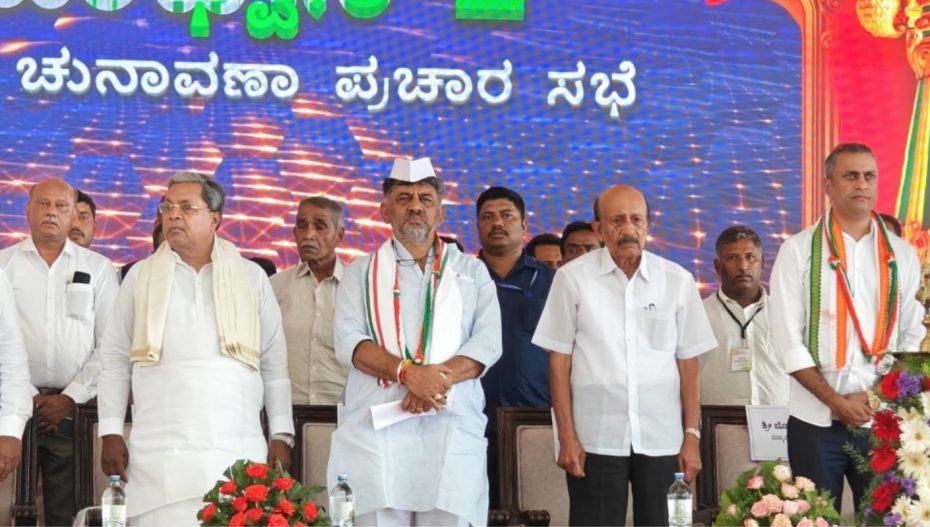New Delhi: The latest electoral survey done by Kannada portal Eedina has given a distinct advantage to the Congress in Karnataka.
Eedina, which was the only media house to accurately predict a Congress victory with 132 to 140 seats in the 2023 state assembly polls, has now said that the state is likely to buck the historical trend of the BJP outdoing the Congress in every election since 2004 in the Lok Sabha elections.
The survey predicted anywhere between 13 and 18 Lok Sabha seats out of the state’s 28 Lok Sabha seats for the Congress, with a possible vote share of 46.41%.
It gave the BJP-Janata Dal (Secular) (JD(S)) alliance between 10 and 13 seats with a 44.27% vote share.
Eedina’s volunteers interviewed 42,674 voters across different caste groups and class backgrounds between March 28 to April 14, after candidates were announced by all parties. This is the second such survey in the last two months.
The first survey, held before candidates were announced, also gave the Congress an edge over the BJP-JD(S) alliance.
It had predicted 11 seats with 43.77% of the votes for the Congress and ten seats with 42.35% of the votes to the BJP-JD(S).
Interestingly, its latest survey found a swell in the Congress’s support, with the party gaining by 2.64% in terms of vote share within the span of a month, translating into a greater number of seats.
If the momentum remains with the Congress, the survey speculated, its tally could also go up to 20. It also pointed out that the BJP-JD(S), too, gained by 1.92% in its predicted vote share after the alliance’s candidates were announced.
The survey said that the state’s Lok Sabha polls appear to be heading for a race to the finish.
Eedina said that according to the survey data, the battle between the Congress and BJP-JD(S) alliance is so close that coming to a definitive conclusion on who will win is difficult.
It added that a Congress victory in at least nine seats and the BJP-JD(S)’s wins in seven looks pretty much clear as of now.
The remaining 12 constituencies will see a fierce battle, but the Congress may have a slight edge in five to seven seats, said the survey.
Around 7.5% of respondents said that they had not decided their vote as of yet, which is why Eedina gave a disclaimer that the BJP’s formidable election machinery could consolidate the swing voters if the Congress failed to carry out a vibrant campaign around its “populist manifesto” in the days leading up to the polls.
“In the meantime, [the] Congress party’s “Nyaya Patra” election manifesto of 25 guarantees has not yet reached the people. Congress vote share is likely to increase further if the declaration of [Rs 1 lakh] per family per year under [the] Mahalakshmi Yojana and [a] complete loan waiver of farmers reaches door-to-door,” the survey said.
Importantly, it added that the Modi factor may work positively for the BJP-JD(S) combine in the last leg of the campaign.
The survey found that respondents believed that inflation, unemployment and corruption have increased during the ten years of Modi’s rule, but were not ready to pin responsibility on the prime minister.
“Even though they accept that BJP has [engaged in] corruption, the [number of] people who say that Modi is not corrupt is more,” the survey said.
“50% of the voters said that they were satisfied with the ten years of the Narendra Modi government, 39% of the voters said that they were not satisfied and 11% of the voters said that they do not know,” it said.
Illustration by Eedina.
Siddaramaiah’s own popularity, against such a backdrop, is one of the primary reasons why the Congress is placed ahead of the BJP-JD(S), according to the survey.
It said that while Modi remained popular in Karnataka, his popularity ratings were behind those of chief minister Siddaramaiah by a narrow margin of around 1.5 percentage points.
Illustration by Eedina.
Apart from issues like inflation and unemployment, corruption emerged as one of the biggest talking points in the survey. Around 37.89% of respondents held the BJP responsible for increasing unemployment, while a little over 36% believed the saffron party should be held accountable for the spike in corruption.
Illustration by Eedina.
Illustration by Eedina.
Siddaramaiah’s bet on launching an agitation against the unfair devolution of taxes to Karnataka may have worked, too, as around 42% of respondents believed that the Union government’s devolution of taxes was disproportionate to Karnataka’s contribution.
Only 27% of respondents believed that the Union government was being fair to the state.
Illustration by Eedina.
This article was first published on The Wire on April 17, 2024.
Also Read: Congress Banks On Its Current And Former MLAs in Gujarat

















